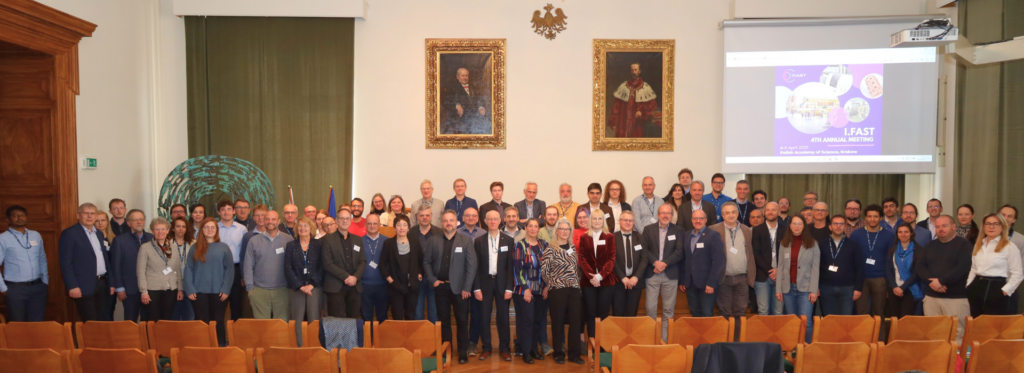The fourth annual meeting of the EU-funded I.FAST (Innovation Fostering in Accelerator Science and Technology) project, held in Kraków on 8 -11 April 2025, offered an excellent overview of the breakthroughs in accelerator science that are shaping the future of the field. From superconducting materials to startup ecosystems, the meeting celebrated technological advances, collaboration, and a clear vision for a new phase of innovation.

Hosted in the project’s final year, the meeting brought together academic leaders, industrial partners, and early-career researchers to share results and lay the groundwork for a potential successor project. The event underscored I.FAST’s impact in accelerating the pace of knowledge transfer, sustainability, and entrepreneurship.
“The true power of I.FAST lies in how it unites research and innovation through meaningful partnerships. What we have seen here in Kraków are not just the results of a very successful project, but also the start of discussions how to continue this path,” said Professor Carsten P Welsch, CI member and member of the I.FAST Scientific Advisory Committee (SAC), during his closing remarks.
The I.FAST consortium has delivered impressive progress, with 41 of 54 deliverables and 54 of 63 milestones completed. Major highlights included:
- Thin-film superconductors for radio-frequency cavities, submitted to the European Strategy for Particle Physics;
- A 70%-efficient klystron prototype, key for CERN’s High-Luminosity LHC upgrade;
- Operational testing of RF photoguns and graphene-based beam windows;
- Progress in permanent magnet dipoles and additive manufacturing;
- Integration of sustainability into accelerator design.
The SAC commended I.FAST’s results across all work packages, especially in transitioning early-stage technologies toward real-world application through academic-industrial cooperation.
Sessions throughout the week emphasized knowledge valorisation and sustainability, real cornerstones for future European research. The SAC noted significant improvements in training, interdisciplinary engagement, and industrial relevance, calling the Challenge-Based Innovation (CBI) programme “a flagship initiative” and praising the creation of a pan-European communication network.
Still, the SAC urged stronger visibility of results, especially through dissemination platforms like Zenodo, and a more systematic cross-work-package integration and communication strategy.
In an invited talk titled “Accelerating Innovation: Supporting Startups in Science and Technology”, Professor Welsch, who founded the company D-Beam, outlined clear steps to foster entrepreneurship across I.FAST’s successor initiatives. His proposed four-pillar model includes:
- Training and mentorship in business fundamentals;
- Innovation brokering to connect academia and industry;
- Micro-grants and seed funding;
- Networking opportunities, including hackathons and alumni summits.
“Startups are vital for technology translation and knowledge valorisation,” Welsch stated. “Without structured support, we risk leaving transformative ideas on the shelf. Future large scale collaborative programmes that build on the legacy of I.FAST can be the engine that drives real impact across Europe’s accelerator ecosystem.”
As the project moves toward its final meeting in October, all eyes are on continuity. A “New Concepts Legacy Report” is in preparation to match emerging ideas with funding calls, and SAC recommendations call for TRL tagging, roadmaps, and impact frameworks across all hardware developments.
In closing, Welsch noted: “We now have clear evidence that a collaborative, challenge-driven approach works extremely well. We need to ensure that we use this momentum to support the next generation of discoveries, not just in labs, but also in startups, policy, and society.”
All presentations can be accessed via the event website: https://indico.cern.ch/event/1464979/overview
